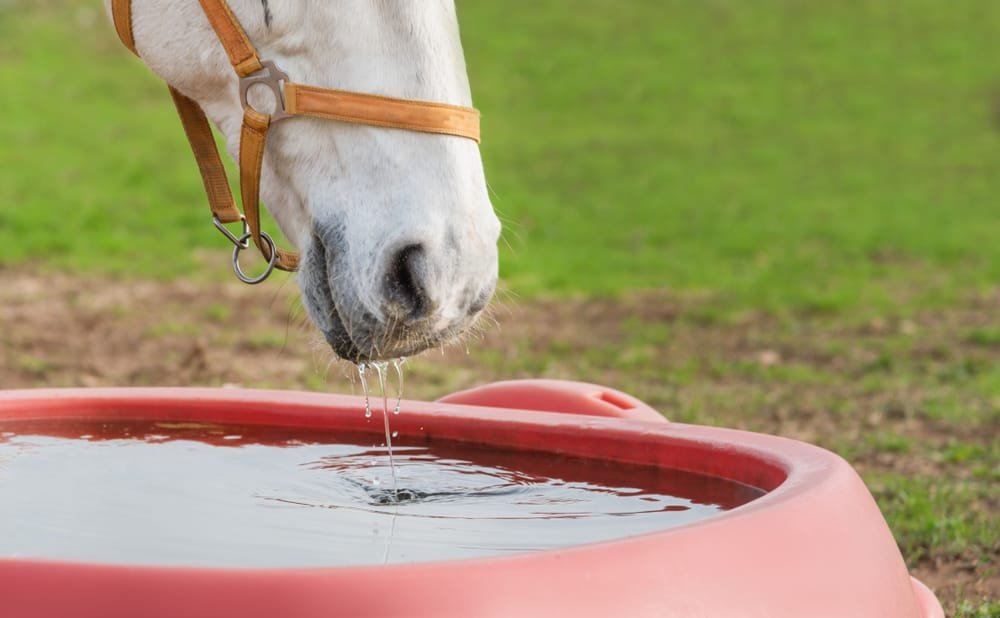Water is one of the most important nutrients for horses, and proper hydration is crucial to maintaining their health and performance.
Unlike food, water is absorbed quickly and directly affects a horse’s body functions. Horses can live without food for longer periods than they can survive without water, making it essential to ensure they have access to clean, fresh water at all times.
1. How Much Water Does a Horse Need?

The amount of water a horse requires varies depending on factors like size, activity level, climate, and diet. On average, an adult horse needs about 5 to 10 gallons of water per day. However, this amount can increase if the horse is in heavy work, during hot weather, or if their diet is dry (such as when they are fed hay instead of fresh grass). Lactating mares, for example, may require up to 12-15 gallons per day to support milk production.
2. Factors That Influence Water Consumption

- Activity Level: Horses in intense work, such as racehorses or those in training, may need more water to replace fluids lost through sweat. A horse that is sweating heavily will require extra hydration to maintain electrolyte balance and prevent dehydration.
- Climate and Weather: Hot weather or humid conditions can increase a horse’s water intake. Horses sweat to cool down, and they need additional water to compensate for the lost fluids. In colder weather, horses may drink less, but their need for water remains constant, and it’s essential to make sure water is available and not frozen.
- Diet: A horse’s diet plays a significant role in its hydration needs. Fresh grass contains a high percentage of water, so horses grazing on pasture may drink less than those fed primarily hay. Hay, being dry, can cause the horse to drink more to stay hydrated.
3. Signs of Dehydration
Dehydration can be a serious issue for horses and can lead to conditions like colic or kidney failure if left untreated. It’s important to monitor your horse’s hydration status regularly. Signs of dehydration include:
- Dry or sticky gums: Gums that are dry or tacky to the touch indicate dehydration.
- Skin tenting: When you pinch the skin and it doesn’t return to its normal position promptly, it’s a sign of dehydration.
- Reduced urine output: Horses may urinate less frequently if they are dehydrated.
- Sunken eyes: Dehydration can cause a horse’s eyes to appear sunken or dull.
If you notice any of these signs, it’s important to offer the horse water immediately and consult a veterinarian if symptoms persist.
4. Water Quality

Not only should horses have access to plenty of water, but the water should also be clean and free of contaminants. Stagnant or dirty water can discourage horses from drinking and may introduce bacteria or harmful chemicals. Ensure that water troughs or buckets are cleaned regularly and that the water is free of algae, debris, or ice in winter months. Some horses are more sensitive to the taste of water, so making sure the water is palatable is also important.
5. Providing Water in Different Situations
- During Workouts or Competition: It’s important to offer water to a horse after exercise to replace lost fluids. Horses may be reluctant to drink immediately after intense work, so providing small amounts of water frequently can encourage them to drink.
- Traveling: Horses may become stressed when traveling, which can affect their water intake. Make sure to offer water at rest stops, and always bring water with you when traveling long distances, especially to areas where water sources may be limited.
- In Cold Weather: In freezing temperatures, water can become inaccessible if it’s left outside in a trough that freezes over. Heated water troughs or water buckets should be used to prevent freezing, ensuring the horse has access to fresh water even in winter months.
6. Electrolyte Balance
In situations where horses are sweating heavily, especially during hot weather or intense exercise, it’s important to replace not just the water but also the electrolytes lost through sweat. Electrolyte supplements can help restore sodium, potassium, and other minerals that are crucial for muscle function and overall hydration.




